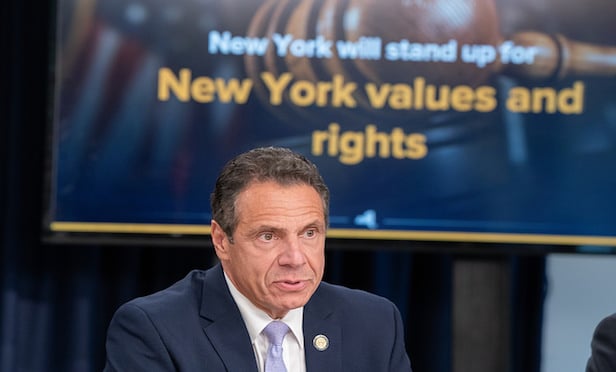
NEW YORK CITY—With the stroke of his pen, New York City Mayor Bill de Blasio is evening the playing field for low-income tenants throughout the city facing eviction in housing court.
The mayor signed into law Intro.214-B on Friday, which was approved by the City Council on July 20. The legislation commits the city to provide all low-income tenants facing eviction access to legal representation in housing court. The program overseen by the Civil Justice Coordinator at the Human Resources Administration will serve 400,000 tenants when it is fully implemented in five years.
“New York City will be the first city in country to ensure anyone facing an eviction case can access legal assistance thanks to this new law. New Yorkers should not lose their homes because they cannot afford a lawyer and stopping wrongful evictions from happening makes both ethical and economic sense,” says Mayor de Blasio.
“Everyone deserves access to legal services, especially when it comes to something as important as their home,” says City Council speaker Melissa Mark-Viverito. “Access to counsel is about leveling the playing field and providing all tenants facing eviction with access to legal advice or representation. No tenant should fear losing their housing simply because they could not afford a lawyer.”
City official note that as recently as 2013, 99% of city landlords were represented by counsel in housing court, as compared to just 1% of tenants. The de Blasio Administration dramatically ramped up the availability of city-funded legal services for low-income tenants, increasing funding for legal assistance for tenants facing eviction and harassment to $62 million in 2016, as compared to just $6 million in 2013.
The program increased tenant representation in housing court from 1% in 2013 to 27% in 2016, and provided more than 50,000 households with legal services since 2014. Residential evictions by marshals declined by 24% during the same period, allowing 40,000 people to remain in their homes during 2015 and 2016, city officials say.
Last February, the de Blasio Administration agreed to more than double financial support, dedicating an additional $93 million at full implementation for a comprehensive program to provide access to legal representation to all low-income tenants facing eviction proceedings in housing court earning up to 200% of the federal poverty line and brief legal assistance for all tenants facing eviction in court whose income is above that level. In total and once the program is fully implemented, the city will spend $155 million annually to cover the costs of the initiative.
Beginning this October, the program will also start providing legal services to New York City Housing Authority tenants in administrative proceedings to terminate their tenancy. There are approximately 3,200 cases that go through NYCHA administrative hearings annually.
Council Member Mark Levine, lead sponsor of Intro 214, says, “Too many of the most vulnerable New Yorkers face eviction simply because they don't have the means to hire an attorney. The council's passage of this bill marked a new beginning of a new era for tenants in New York City.
He adds, “No longer will low-income New Yorkers have to fend for themselves in housing court. This new law is a historic step forward in the fight against unlawful evictions.”
The New York City Public Engagement Unit and the Human Resources Administration will be conducting outreach to educate tenants about their legal rights. Tenants are encouraged to call 311 if they are facing an eviction and/or visit HRA offices located in housing courts throughout the city.

The mayor signed into law Intro.214-B on Friday, which was approved by the City Council on July 20. The legislation commits the city to provide all low-income tenants facing eviction access to legal representation in housing court. The program overseen by the Civil Justice Coordinator at the Human Resources Administration will serve 400,000 tenants when it is fully implemented in five years.
“
“Everyone deserves access to legal services, especially when it comes to something as important as their home,” says City Council speaker Melissa Mark-Viverito. “Access to counsel is about leveling the playing field and providing all tenants facing eviction with access to legal advice or representation. No tenant should fear losing their housing simply because they could not afford a lawyer.”
City official note that as recently as 2013, 99% of city landlords were represented by counsel in housing court, as compared to just 1% of tenants. The de Blasio Administration dramatically ramped up the availability of city-funded legal services for low-income tenants, increasing funding for legal assistance for tenants facing eviction and harassment to $62 million in 2016, as compared to just $6 million in 2013.
The program increased tenant representation in housing court from 1% in 2013 to 27% in 2016, and provided more than 50,000 households with legal services since 2014. Residential evictions by marshals declined by 24% during the same period, allowing 40,000 people to remain in their homes during 2015 and 2016, city officials say.
Last February, the de Blasio Administration agreed to more than double financial support, dedicating an additional $93 million at full implementation for a comprehensive program to provide access to legal representation to all low-income tenants facing eviction proceedings in housing court earning up to 200% of the federal poverty line and brief legal assistance for all tenants facing eviction in court whose income is above that level. In total and once the program is fully implemented, the city will spend $155 million annually to cover the costs of the initiative.
Beginning this October, the program will also start providing legal services to
Council Member Mark Levine, lead sponsor of Intro 214, says, “Too many of the most vulnerable New Yorkers face eviction simply because they don't have the means to hire an attorney. The council's passage of this bill marked a new beginning of a new era for tenants in
He adds, “No longer will low-income New Yorkers have to fend for themselves in housing court. This new law is a historic step forward in the fight against unlawful evictions.”
The
© Touchpoint Markets, All Rights Reserved. Request academic re-use from www.copyright.com. All other uses, submit a request to [email protected]. For more inforrmation visit Asset & Logo Licensing.






